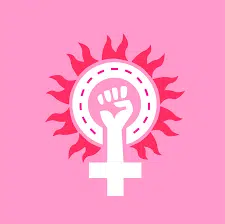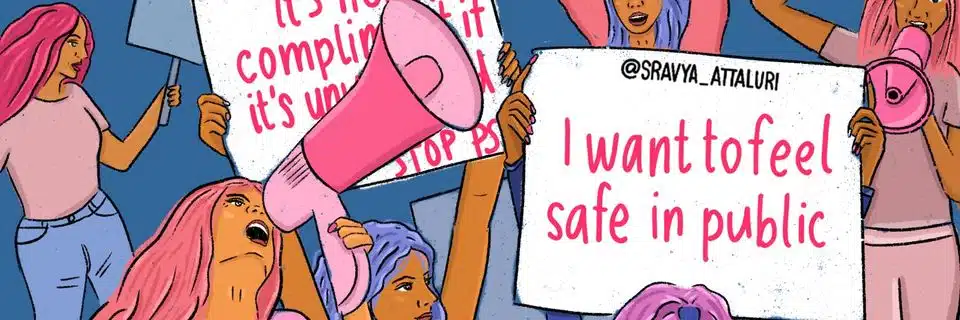Our Streets Now: Ending Public Street Harassment

Public Street Harassment (PSH) of women and marginalised genders is an international issue, it is the most common form of violence against women and girls and is epidemic in the UK, reaching the point where it is expected and normalised. I bet you every girl and women you speak to has been yelled at by usually a male harasser in the street countless times. PSH ranges from the typical car horn honking to creepy or terrifying verbal comments. Each experience leaves women and girls feeling scared, unsafe and can trigger PTSD. There is never a good reason to hurt or harass someone. The normalisation of this means we have been taught that we must protect ourselves, dressing in a different way, not walking after dark and not going anywhere by yourself. This leads to the internalisation of the concept of victim-blaming, which is wrong, harmful and does nothing to address the root causes. PSH compounds inequality and facilitates other misogynistic behaviours. Our Streets Now is an incredible national organisation in the UK fighting to end street harassment, links to their website and social media are below this article.
I was fortunate enough to interview an inspirational young writer and poet, Isabella, who has worked with the organisation regionally and nationally since September 2021. The organisation asked to use the poem she wrote in the wake of the Sarah Everard case called ‘Concrete Change’, she then applied to be an ambassador and a national writer. She spoke to me about the organisations aims and why they’re so important.
Our Streets Now as an organisation is based on the belief that women and girls should feel and be safe as a matter of equality. They are campaigning for not only legislative but also cultural change to achieve this objective. PSH has been normalised in our society and it is not illegal. This means that women and girls don’t have a guaranteed supportive space within their family, friends and institutions to talk about their experiences of PSH. Since the age of 15, 68% of women have experienced sexual harassment with their first experience often being below the age of 18. If you have experienced this and end up telling someone you will be familiar with a range of reactions from people entirely not believing you to women nodding sympathetically, maybe sharing their own similar experience, or just muttering ‘it’s awful’ or ‘it’s ridiculous’ then moving on. The shame and victim blaming surrounding PSH often puts women off sharing their stories at all, or they are simply so used to it that it doesn’t feel important to tell others.
Our Streets Now wants to change this. It started as a conversation between two sisters about how PSH restricts their lives, they decided they weren’t going to put up with it and morphed their anger into a now national movement creating significant waves. They use various social media platforms to promote education and legislation campaigns. Legislation is needed to provide legal backing for victims and to actively encourage the need for education and increased access to support.
They recognise one of the main issues contributing to the persistence of this problem is that no one wants to talk about it, often unwilling to accept that people they know or they themselves are the problem. This is compounded by the way women are portrayed in the media and how they’re talked about in general. Many know that PSH is wrong but don’t say anything, apart from ‘it’s not me’ or ‘not all men’. But passive bystanders only facilitate it. By not intercepting, calling people out or being willing to talk to friends or family about it, you are contributing to an environment where PSH is effectively accepted and even reinforced. To turn this around young people need good examples, they need active anti-misogynists. Earlier intervention involving education of students would help to reverse some of societies negative gender-based norms. This includes the disassociation between femininity and weakness compared to masculinity and strength and to be explicitly taught that all genders have equal status and deserve equal respect.
One of the messages Our Streets Now wants those who have experienced PSH to know is that it’s not your fault and however it makes you feel or respond is ok and your choice. It is often hard to tell others but if you feel you can it is important to help eliminate associated shame. There is help and support available if you don’t feel comfortable talking to family and friends. Or, for example, Our Streets Now uses anonymous stories, or testimonies, in their campaigns to stimulate change, raise awareness, and remind other women they are not alone. You can visit the Our Streets Now platforms below to read them or add your own, the links to various support services are also available. The organisation has also helped to set up an anonymous report and support service at the University of Nottingham.
Isabella is optimistic that with the right kind of legislation PSH can be removed from culture, it is difficult to assert a timescale, but she says there is hope in the younger generation. What can you do? The answer is simple but may be a challenge for you to implement. Call people out, your friends, your family even yourself, try to explain why it’s wrong and the implications. This doesn’t mean just the behaviour that comes under the umbrella of PSH but the attitudes and comments that facilitate it. You don’t have to laugh at sexist jokes or standby speechless when you witness PSH. You can call people out. There are also many petitions you can sign, follow Our Streets Now to keep up with these, to help make PSH a punishable offence and protect those at risk by providing disincentive for perpetrators and encouraging education against it. PSH shouldn’t and doesn’t have to be normal.
You can do something about this. It started with a conversation, and it will end with change.
Website: https://www.ourstreetsnow.org/
Instagram: https://www.instagram.com/ourstreetsnow/?hl=en
Twitter: https://twitter.com/ourstreetsnow
Facebook: https://www.facebook.com/OurStreetsNow/
LinkedIn: https://www.linkedin.com/company/our-streets-now/

Credit to Sravya Attulari.

